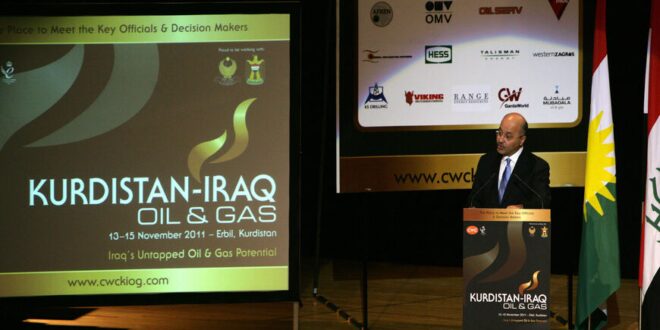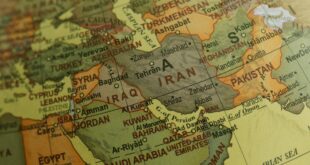The Iraqi Ministry of Oil has announced plans to establish a new oil company for the Kurdistan Region.
Amid the tense relations between the federal government and the Kurdistan Regional Government (KRG) over the implementation of the Federal Supreme Court’s ruling that deemed the 2007 oil and gas law governing the country’s Kurdistan Region to be unconstitutional, the Iraqi Ministry of Oil announced May 21 that the federal government aims to establish a new oil company in the Kurdistan Region. The company is tasked with signing new service contracts with oil firms operating in the Kurdistan Region, it said.
The announcement came after the Iraqi Ministry of Oil confirmed that it had embarked on a series of steps to implement the court ruling and to include the management of oil and gas in the exclusive powers given the federal government.
The Iraqi Supreme Court proclaimed Feb. 15 Iraqi Kurdistan’s oil and gas law of 2007 unconstitutional. The court abolished the law because it violates constitutional provisions, and ordered the Kurdistan Region to hand over oil production to the federal government.
The Federal Supreme Court is the top judicial authority in Iraq. It is the body that decides the constitutionality of laws, regulations, instructions and orders disputed between the federal government and the regions.
The KRG independently exports crude oil to countries around the world through the Turkish port of Ceyhan.
The court ruling came after the former oil ministers in the central government filed two lawsuits in 2012 and 2019 demanding that oil and gas extracted in Kurdistan be exported through the federal government.
In addition, Baghdad had filed a legal case against Turkey over Kurdish oil exports due to its involvement in the oil export for the international market via Turkey’s Ceyhan port.
The court indicated in a statement that the ruling orders the KRG to “hand over the entire oil production from oil fields in Kurdistan and other areas from which the KRG Ministry of Natural Resources was extracting to the federal government represented by the Iraqi Ministry of Oil, so that it uses its constitutional power when it comes to oil exploration, extraction and export.”
The KRG has rejected the ruling, calling it not only “unconstitutional” but “unjust.” It added that it will take all constitutional, legal and judicial measures to protect all oil and gas contracts.
“To us, the constitution goes above any court ruling, and we are definitely going to abide by the constitution, respect the constitution, fulfill our duties, but also demand our rights the way they are stipulated in the constitution,” KRG Prime Minister Masrour Barzani said during the World Economic Forum in Davos May 24.
On May 7, Iraq’s Oil Minister Ihsan Abdul Jabbar said that the ministry will start implementing the court ruling in order to lay the foundations for a strong federal state that runs its oil activity based on scientific standards.
He noted that the companies affiliated with the ministry will provide more than 90% of state revenues. Thus, the Ministry of Oil must remain away from political interference, because any interference will cause the economic system’s collapse, and subsequently, the country’s collapse.
Al-Monitor learnt from an informed source that the Iraqi Ministry of Oil has already begun communicating with oil companies operating in the Kurdistan Region, warning them against carrying on with their operation without coordinating with Baghdad.
In a move that reflects how serious the Iraqi government is in handling this file, the Iraqi Ministry of Oil appointed Cleary Gottlieb Steen & Hamilton to contact the gas and oil firms operating in Iraqi Kurdistan to “initiate discussions to bring their operations into line with applicable Iraqi law,” according to a missive seen by Reuters in May.
The implementation of the court ruling will require changes to the contractual regime for the firms, the ministry added. The missive marks the first contact between the ministry and oil companies operating in the Kurdistan Region.
In response, the Kurdish presidency submitted a request to the United Nations Security Council, calling for an international discussion of the dispute between Baghdad and Erbil.
The semi-official Rudaw news agency, which is affiliated with the Kurdistan Democratic Party, reported that “all 15 members of the council expressed their support for Barzani’s requests, calling on the UN to appoint an official from its Assistance Mission for Iraq (UNAMI) to oversee dialogue between the Kurdistan Regional Government (KRG) and the Iraqi federal government,” aimed at finding a permanent and legal solution to the outstanding problems between the two parties.
On May 26, in its extension of the UN Assistance Mission for Iraq (UNAMI), the Security Council added extra tasks in regard to Baghdad-Erbil relations.
“Further, the Special Representative and UNAMI were tasked with actively supporting the Government of Iraq and the Kurdistan Regional Government to work together and engage in regular and structured dialogue to resolve outstanding issues, including security provisions, budgetary arrangements and the management of Iraq’s oil and gas resources, and to implement existing agreements, including the 2020 Sinjar Agreement,” the extension statement read.
However, Kurdistan’s presidency was quick to deny submitting a request to the UN Security Council, following the criticism by various parties in Baghdad, and more precisely the missile attacks that targeted the Kurdish area and that no armed groups claimed responsibility for.
Commenting on the relations with the Kurdistan Region, Jabbar stated that there is a historical mistrust between the federal government and the Kurdistan Region. He added, “We must be ready to face the internal and external challenge when implementing the court’s ruling.”
He also expressed his readiness to resume the dialogue, and stressed at the same time that the government in Baghdad will embark on implementing the ruling, because Iraq’s unity when it comes to the oil policy is vital and important for our present and our future.
A leaked document from the oil minister revealed that the ministry aims to become fully in charge of managing the crude oil file.
According to the document that is addressed to the General Authority for Monitoring the Allocation of Federal Imports, the Ministry of Oil addressed the KRG to nominate authorized representatives of the relevant authorities tasked with implementing the court’s ruling. Yet they have not been appointed so far.
It continued that the ministry’s attempts to establish an administrative system that guarantees the optimal investment of state resources and serves the interests of all parties in accordance with the court’s ruling, and in a way that allows the Kurdistan Region to manage its resources through federal institutions with expanded powers, have not led to the desired results. The KRG expressed its opinion in this regard, and considered the court’s decision unconstitutional and unacceptable, and has totally rejected it.
 Eurasia Press & News
Eurasia Press & News




